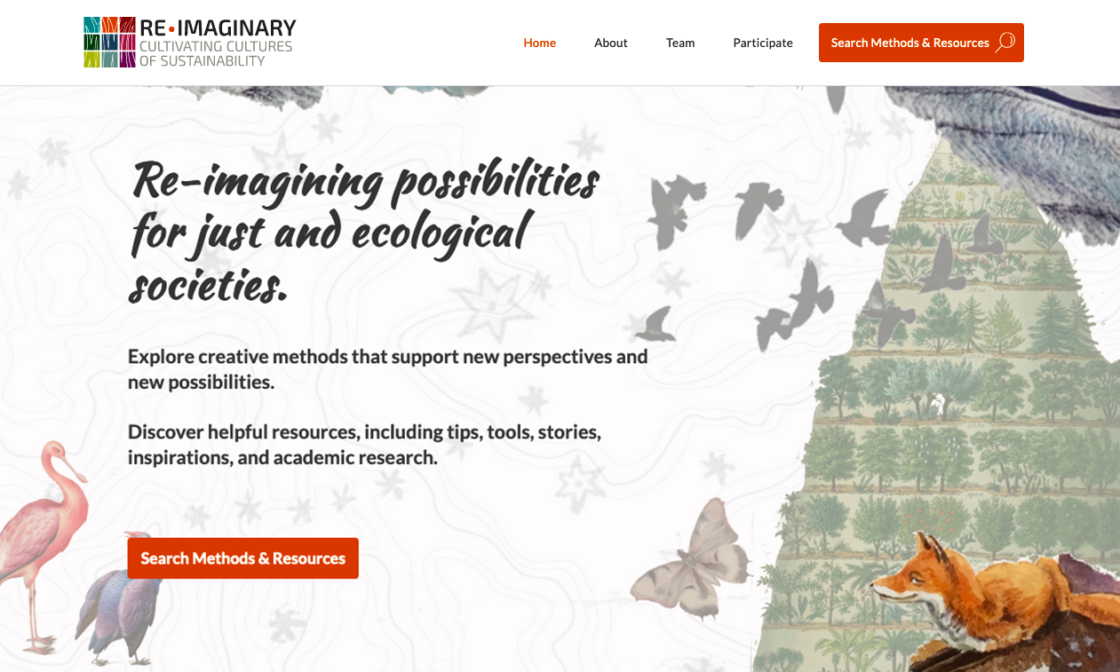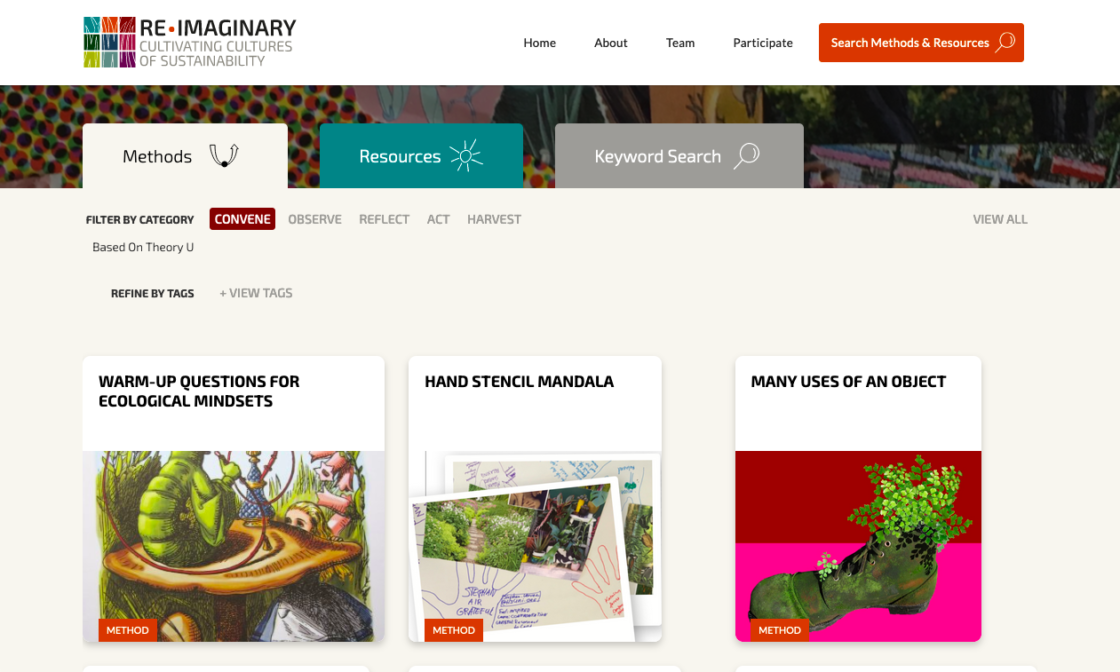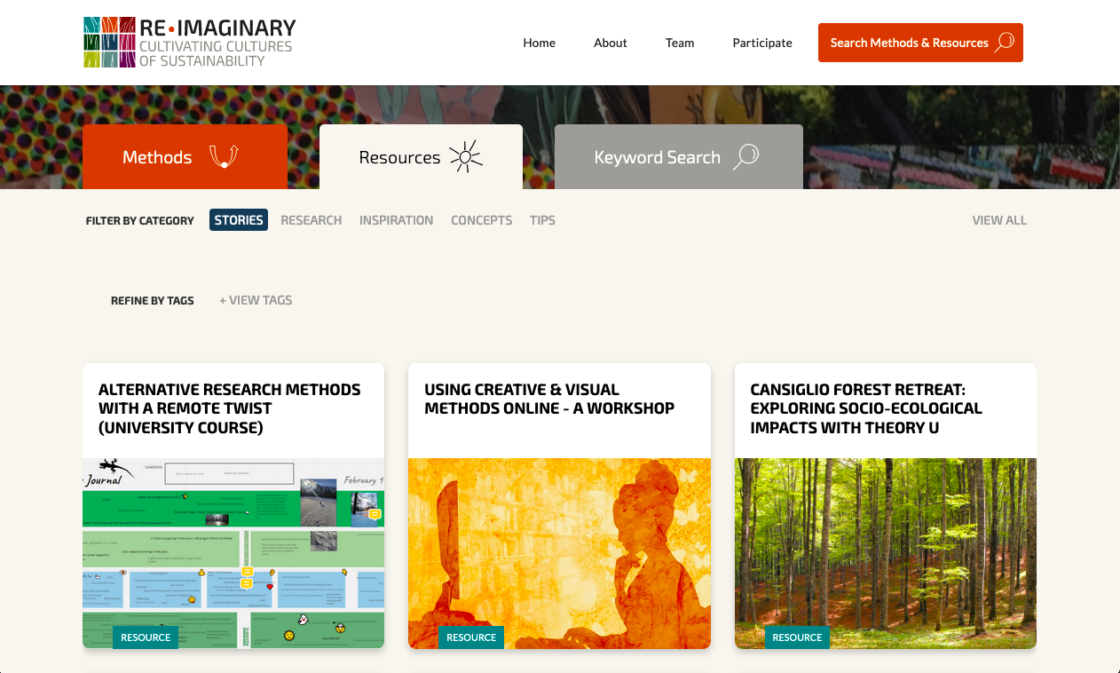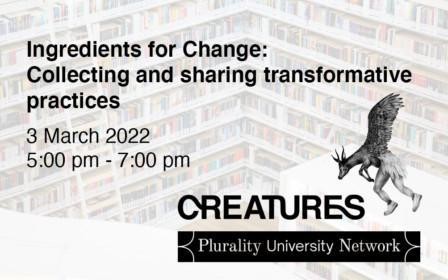The Re.imaginary project is an online database of arts-based, participatory methods that can be used by anyone to explore different aspects of sustainability. The website was developed by a collective of sustainability researchers and practitioners, in response to the need for new, transformative perspectives that can radically change human-environment relationships. This means moving towards regenerative ways of life that value living systems in a more holistic way.
Connections to eco-social sustainability:
The methods that the Re.imaginary collective have gathered, designed and adapted are intended to spark alternative paradigms and mindsets. These help us to begin from where we are, by recognising and working on our own assumptions and worldviews (as part of a process of ‘inner transformation’ involving deep reflexivity). At the same time, creative methods can also help to generate inclusive spaces for group work, where others can be invited to participate equitably in the process of developing new forms of knowledge and action for sustainability.
“We want to support holistic and integrated ways of learning and knowing, opening the floor for different ways of creating knowledge, drawing from Indigenous perspectives, experiential learning, somatic embodied ways of knowing and sensing, but also the emotional side of producing knowledge – which is important and so many times dismissed. We have found that creative methods and Theory U processes can help us achieve that.” Angela Moriggi, Re.imaginary project
Creative methods can provide a welcoming platform to weave together these different ways of knowing, contributing to the aim of a truly trans-disciplinary and pluralistic sustainability science.
Transformative creative practice:
The Re.imaginary project has prioritised methods meant to evoke transformative mindsets – new frames that help to direct and motivate people towards sustainability transformations. Transformative mindsets can be activated by new ways of seeing, sensing, feeling, and envisioning the world. These allow us to imagine and to experience a level of emotional connectedness and care for other beings that other ways of knowing may not. They challenge the anthropocentric worldviews and mindsets that we often carry with us and that shape our everyday actions.
“We try to understand issues from the perspective of other beings, and by doing so we enlarge our horizons. We enlarge our perspectives – not only to try to understand what an ant, or an eagle, or a bear would think of a certain situation – but also, to become more empathetic with other humans.” Angela Moriggi
An important aspect of the Re.imaginary website is that methods and resources are made visible and usable for everyone. Each method is complemented by specific instructions, allowing people to experiment with them, as well as highlighting their importance as a wider strand of thought and action. The website encourages and enables translations – across different creative fields, into sustainability science (and beyond!). The development of the resources – and communities around the resources – also creates playful spaces where the direction of sustainability science can be (co-)creatively re-visioned.
On learning and evaluation:
Evaluation has been an important part of the events that the ReImaginary team have organised to promote the resource collection. They have been gathering feedback from education, research, collaboration and dissemination events. Iterative learning and evaluation is an active research topic within the team, currently developing new frameworks.
“What we really like to do is to create meaningful processes…not just to use creative methods because they are cool… inserting them here and there. Creativity is really tied into every step of the way. It’s really about the processes and not each specific method.” Angela Moriggi
Learn more:
Visit the website at: https://www.reimaginary.com/
Pearson, K. R. (2021). Imaginative leadership: A conceptual frame for the design and facilitation of creative methods and generative engagement. In A. Franklin (Ed.), Co-creativity and engaged scholarship: Transformative methods in social sustainability research. Palgrave-Macmillan. DOI: https://doi.org/10.1007/978-3-030-84248-2
Moriggi A. (2021). An ethos and practice of appreciation for transformative research: Appreciative Inquiry, care ethics, and creative methods. In A. Franklin (Ed.) Co-creativity and engaged scholarship. Transformative methods in social sustainability research. London: Palgrave Macmillan. DOI: https://doi.org/10.1007/978-3-030-84248-2
Watch the Repositories event on the CreaTures YouTube channel, featuring Kelli Rose Pearson talking about the Re.imaginary website as a repository of transformative methods.
Project credits:
The Re.imaginary team includes Kelli Rose Pearson, Angela Moriggi, Siri Pisters, Anke De Vrieze, Sara Grenni, Marta Nieto Romero.
Partners include: SUSPLACE, RECOMS, Economic Transformations Group, Orca Song Institute, Sustainability Atelier, The Centre for Space, Place and Society, Imaginative Disruptions, ParCentra and Jan van Boeckel.



